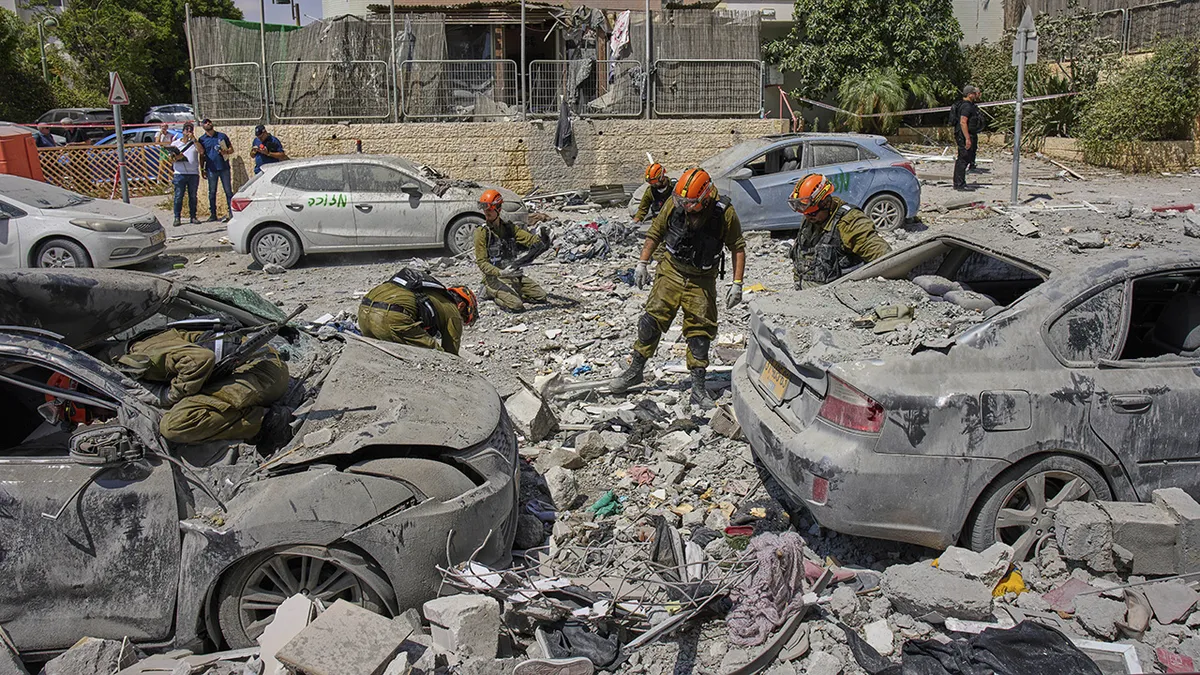
The Israeli military recently intercepted two drones that were likely launched from Iran, as tensions between the two nations persist despite an ongoing ceasefire. The Israeli Air Force confirmed on X, stating, “The Air Force intercepted earlier this evening two unmanned aerial vehicles that were making their way toward the country's territory, likely from Iran. The interceptions were carried out outside the country's territory.” Israeli officials have indicated that any violation of the ceasefire by Iran will be met with a strong military response.
Senator Rand Paul (R-Ky.) recently discussed President Donald Trump’s strikes on Iran's nuclear facilities, noting the uncertainty surrounding their effectiveness. Reports suggest that Iran could have its nuclear program operational again within a year. Paul mentioned he had seen reports indicating that 400 kg of 60% enriched uranium had been removed from the facilities prior to the strikes. “I don’t think it’s known yet,” he stated, emphasizing the need for patience in assessing the situation.
Vice President JD Vance praised President Trump’s military actions against Iranian nuclear facilities, stating that Trump had given Iran a 60-day window to abandon its nuclear ambitions. Vance emphasized the importance of preventing the world’s most dangerous actors from acquiring nuclear weapons. He noted that the strikes were executed without any American casualties, showcasing a strategic approach to national security.
In a recent development, House Speaker Mike Johnson confirmed that classified briefings for House and Senate members regarding the U.S. strikes on Iranian nuclear sites have been postponed until later in the week. Some lawmakers expressed frustration with the delay, calling for transparency from the administration regarding the situation between Israel and Iran.
According to sources familiar with the Defense Intelligence Agency's (DIA) assessment, Iran's nuclear program could be operational again in as little as two months following the recent U.S. strikes. The report suggests that while some infrastructure was destroyed, key facilities remain intact and can be rebuilt. This highlights the ongoing threat posed by Iran's nuclear ambitions.
Retired General David Petraeus expressed confidence that the recent U.S. military strikes have significantly set back Iran's nuclear program. He believes the damage inflicted could impact Iran's nuclear ambitions for years. Petraeus noted the need for thorough assessments to ensure that high-enriched uranium was not relocated to other sites.
International Atomic Energy Agency (IAEA) Director General Rafael Mariano Grossi revealed that the agency currently cannot locate nearly 900 pounds of potentially enriched uranium following the U.S. military strikes. The uncertainty surrounding the whereabouts of this material raises concerns about Iran's compliance with international nuclear agreements.
Brett McGurk, former National Security Council coordinator for the Middle East, praised the Trump administration's handling of the Iranian conflict, describing the ceasefire as a significant opportunity for diplomacy. Meanwhile, the Israeli government reiterated its commitment to the ceasefire but stated that any violations would be met with a decisive military response.
Israeli officials have clarified that the country will uphold the ceasefire with Iran as long as Tehran does the same. However, Israeli Defense Minister Israel Katz warned that any breach of the ceasefire would prompt a strong military counteraction. This stance reflects Israel's ongoing commitment to national security amidst the fragile peace.
The U.S. State Department is actively assisting over 27,000 Americans seeking to leave Israel amidst the ongoing conflict. The department has been facilitating emergency flights for U.S. citizens and their families, ensuring their safety during this tumultuous period.
The USS Gerald R. Ford carrier strike group has embarked on a scheduled deployment, positioning itself near Israel as tensions in the region remain high. This deployment enhances U.S. military readiness and provides President Trump with options should the situation escalate further.
The fragile ceasefire between Israel and Iran continues to be tested, with both sides preparing for potential escalations. The international community is closely monitoring the situation, hoping for a lasting resolution to the longstanding tensions. As President Trump emphasizes the importance of peace through strength, the world remains watchful for any signs of renewed conflict.